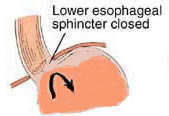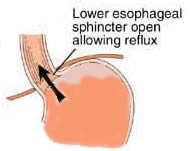Causes of GERD
There are multiple causes responsible for initiating GERD, and different causes may be functioning in different individuals or even in the same individual at different times. The commonest causes responsible for GERD have been listed below:


Functional abnormalities of the lower esophageal sphincter
-> Abnormally weak contractions of the sphincter
-> Abnormal relaxations of the sphincter
Both of the above contribute to increased chances of backflow of the stomach contents into the esophagus.
Hiatus Hernia:
A condition in which there is the protrusion of the stomach up into the opening normally occupied by the esophagus in the diaphragm [the muscle that separates the chest (thoracic) cavity from the abdomen].
Abnormal esophageal contractions:
Co-ordinated esophageal contractions cause the forward movement of food from the esophagus into the stomach. When the wave of contraction is defective, the refluxed acid is not pushed back into the stomach and it can cause damage to the lining of the esophagus.
Delayed emptying of the stomach:
When food remains in the stomach for a longer duration, the stomach is distended for a longer time and this increases the chances of reflux of the stomach contents.
There are several other contributing factors for GERD, which are as follows:
Dietary habits: Fatty and fried foods, chocolates, garlic and onions, drinks with caffeine, acid foods such as citrus fruits and tomatoes, spicy foods, mint flavorings, pungent foods, etc
Habits: Use of alcohol, cigarettes; poor posture (slouching), especially after meals
Drugs: Calcium channel blockers, antihistamines, theophylline, nitrates,
Eating habits: Large meals, eating soon before sleeping
Stress: Though this has not been directly linked to GERD, most patients report an increase in their symptoms during stressful times.
Other contributory conditions: Obesity, pregnancy, diabetes, obesity, rapid weight gain, etc.

Written & Approved by-
Dr. Rajesh Shah
M.D. (Hom.)